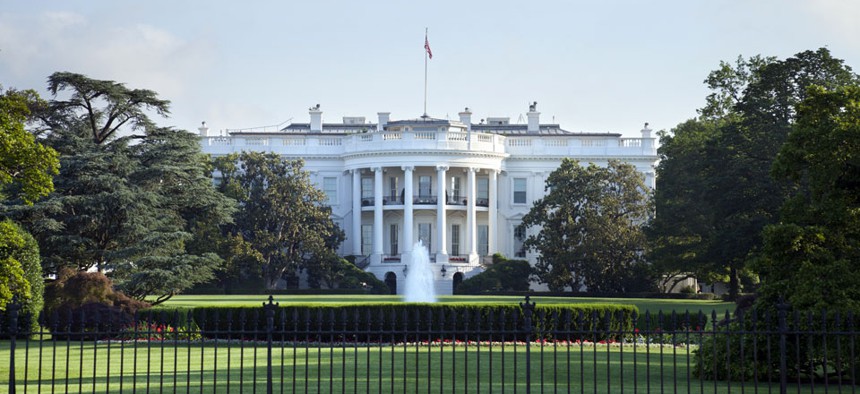
Dan Thornberg/Shutterstock.com
Is the White House Lying or Just Bad at Crisis Communications?
Ordering a cheeseburger with fries while a downed airline smolders may not have been a great decision.
President Obama's decision to stick with his schedule of fundraisers and photo opportunities amid twin foreign policy crises elicited one of the strangest statements you'll ever see from a White House.
"It is rarely a good idea to return to the White House just for show, when the situation can be handled responsibly from the road," said Jennifer Palmieri, the White House communications director. "Abrupt changes to his schedule can have the unintended consequence of unduly alarming the American people or creating a false sense of crisis."
Where do I start?
First, the phrase "just for show" is indicative of the Obama White House conceit that their guy is above politics. The fact is, all presidents do things just for show, because the office is inherently political, and one of the levers of power can be found in the public theater. Think of Abraham Lincoln's split rails, William McKinley's front porch, Theodore Roosevelt's whistle-stops, Franklin Roosevelt's fireside chats—oh, and Barack Obama's entire 2008 campaign, not to mention his "bear-on-the-loose" jaunts with ordinary Americans.
The hypocrisy is staggering. How is playing pool and drinking beer with the governor of Colorado not "just for show"? Obama and his team consistently respond to criticism by dismissing the media's focus on "optics," even as they craft and control the president's image more aggressively than perhaps any previous White House.
Second, while Palmieri is correct that gutting a presidential schedule is rarely a good idea, there are times when it is. You could make an argument that Thursday was one such time, when the Gaza Strip erupted with violence and Russian President Vladimir Putin's allies shot a passenger plane from the sky. A president can bring calm and clarity to a confusing situation, or he can add to public anxiety.
About the time a Russian news agency reported 23 Americans were aboard the downed liner—a report that was responsibly attributed and distributed by U.S. news agencies—Obama was ordering lunch with a single mother at the Charcoal Pit in Delaware.
Mr. President, you better get those burgers and shakes to go. https://t.co/S0lBSJjeOu #MH17 #Ukraine #PhotoOops
— Ron Fournier (@ron_fournier) July 17, 2014That tweet was based on my knowledge of how a White House works in crisis. It happens: Harrowing news pierces the security bubble, and a presidential aide tells the president, "I think we should go, sir." Let's figure out what's happening, and make sure we're not the part of an embarrassing split screen on cable TV.
The Russian report was wrong, which isn't a surprise, and which doesn't substantially alter the urgency of the moment: Let's go, sir. Later on Thursday, I confirmed with a White House official that there was a discussion among presidential aides in Delaware about the poor timing of the restaurant stop.
The third problem with Palmieri's quote is the most obvious—"unduly alarming the American people or creating a false sense of crisis."
Unduly alarming? False sense of crisis? A ground war in the Middle East and raining bodies over Ukraine are cause for alarm. These was no false crisis—no more than the string of second-term controversies that have undermined Obama's credibility are "false scandals."
This points to the fundamental problem with Obama's communications ethos: He and his advisers are so certain about their moral and political standing that they believe it's enough to make a declaration. If we say it, the public should believe it.
That's not how it works. A president must earn the public's trust. He must teach and persuade; speak clearly, and follow word with action; show empathy toward his rivals, and acknowledge the merits of a critique. A successful president pays careful attention to how his image is projected both to U.S. voters and to the people of the world. He knows that to be strong, a leader must look strong. Image matters, especially in an era so dominated by them.
In the story that quoted Palmieri, New York Times journalist Michael D. Shear reported that White House aides "gave no consideration to abandoning the president's long-planned schedule" on Thursday. No consideration, really? Is this White House so stubborn and out of touch that presidential advisers didn't even considertweaking his schedule? Unless the White House lied to Shear, the answer is yes.
Where WH reverses course to acknowledge that optics do matter. Just that #MH17 and Gaza Strip aren't real crises: http://t.co/8Ewu96Imlk
— Ron Fournier (@ron_fournier) July 20, 2014(Image via Dan Thornberg/Shutterstock.com)







